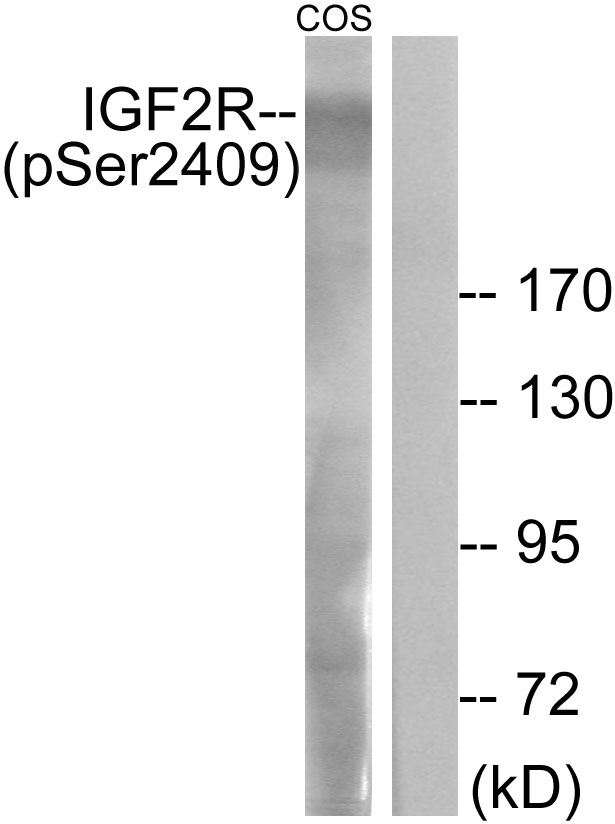IGF2R (Phospho-Ser2409) Antibody
Purified Rabbit Polyclonal Antibody (Pab)
- SPECIFICATION
- CITATIONS
- PROTOCOLS
- BACKGROUND

Application
| WB, IHC |
|---|---|
| Primary Accession | P11717 |
| Reactivity | Human, Mouse, Rat |
| Host | Rabbit |
| Clonality | Polyclonal |
| Calculated MW | 274375 Da |
| Gene ID | 3482 |
|---|---|
| Other Names | Cation-independent mannose-6-phosphate receptor, CI Man-6-P receptor, CI-MPR, M6PR, 300 kDa mannose 6-phosphate receptor, MPR 300, Insulin-like growth factor 2 receptor, Insulin-like growth factor II receptor, IGF-II receptor, M6P/IGF2 receptor, M6P/IGF2R, CD222, IGF2R, MPRI |
| Dilution | WB~~1:1000 IHC~~1:50~100 |
| Format | Rabbit IgG in phosphate buffered saline (without Mg2+ and Ca2+), pH 7.4, 150mM NaCl, 0.09% (W/V) sodium azide and 50% glycerol. |
| Storage Conditions | -20℃ |
| Name | IGF2R |
|---|---|
| Synonyms | MPRI |
| Function | Mediates the transport of phosphorylated lysosomal enzymes from the Golgi complex and the cell surface to lysosomes (PubMed:18817523, PubMed:2963003). Lysosomal enzymes bearing phosphomannosyl residues bind specifically to mannose-6-phosphate receptors in the Golgi apparatus and the resulting receptor-ligand complex is transported to an acidic prelysosomal compartment where the low pH mediates the dissociation of the complex (PubMed:18817523, PubMed:2963003). The receptor is then recycled back to the Golgi for another round of trafficking through its binding to the retromer (PubMed:18817523). This receptor also binds IGF2 (PubMed:18046459). Acts as a positive regulator of T-cell coactivation by binding DPP4 (PubMed:10900005). |
| Cellular Location | Golgi apparatus membrane; Single-pass type I membrane protein. Endosome membrane; Single-pass type I membrane protein. Note=Mainly localized in the Golgi at steady state and not detectable in lysosome (PubMed:18817523) Colocalized with DPP4 in internalized cytoplasmic vesicles adjacent to the cell surface (PubMed:10900005). |

Thousands of laboratories across the world have published research that depended on the performance of antibodies from Abcepta to advance their research. Check out links to articles that cite our products in major peer-reviewed journals, organized by research category.
info@abcepta.com, and receive a free "I Love Antibodies" mug.
Provided below are standard protocols that you may find useful for product applications.
Background
Transport of phosphorylated lysosomal enzymes from the Golgi complex and the cell surface to lysosomes. Lysosomal enzymes bearing phosphomannosyl residues bind specifically to mannose-6- phosphate receptors in the Golgi apparatus and the resulting receptor-ligand complex is transported to an acidic prelyosomal compartment where the low pH mediates the dissociation of the complex. This receptor also binds IGF2. Acts as a positive regulator of T-cell coactivation, by binding DPP4.
References
Morgan D.O.,et al.Nature 329:301-307(1987).
Oshima A.,et al.J. Biol. Chem. 263:2553-2562(1988).
Gemma A.,et al.Submitted (NOV-1998) to the EMBL/GenBank/DDBJ databases.
Killian J.K.,et al.Mamm. Genome 10:74-77(1999).
Mungall A.J.,et al.Nature 425:805-811(2003).
If you have used an Abcepta product and would like to share how it has performed, please click on the "Submit Review" button and provide the requested information. Our staff will examine and post your review and contact you if needed.
If you have any additional inquiries please email technical services at tech@abcepta.com.













 Foundational characteristics of cancer include proliferation, angiogenesis, migration, evasion of apoptosis, and cellular immortality. Find key markers for these cellular processes and antibodies to detect them.
Foundational characteristics of cancer include proliferation, angiogenesis, migration, evasion of apoptosis, and cellular immortality. Find key markers for these cellular processes and antibodies to detect them. The SUMOplot™ Analysis Program predicts and scores sumoylation sites in your protein. SUMOylation is a post-translational modification involved in various cellular processes, such as nuclear-cytosolic transport, transcriptional regulation, apoptosis, protein stability, response to stress, and progression through the cell cycle.
The SUMOplot™ Analysis Program predicts and scores sumoylation sites in your protein. SUMOylation is a post-translational modification involved in various cellular processes, such as nuclear-cytosolic transport, transcriptional regulation, apoptosis, protein stability, response to stress, and progression through the cell cycle. The Autophagy Receptor Motif Plotter predicts and scores autophagy receptor binding sites in your protein. Identifying proteins connected to this pathway is critical to understanding the role of autophagy in physiological as well as pathological processes such as development, differentiation, neurodegenerative diseases, stress, infection, and cancer.
The Autophagy Receptor Motif Plotter predicts and scores autophagy receptor binding sites in your protein. Identifying proteins connected to this pathway is critical to understanding the role of autophagy in physiological as well as pathological processes such as development, differentiation, neurodegenerative diseases, stress, infection, and cancer.



